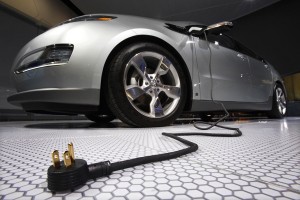 Plug-in electric vehicles may just be entering the market, but most U.S. consumers are ready to buy them. E Source recently analyzed data from the Nielsen Energy Survey and found that 85 percent of U.S. consumers say they would purchase a battery-driven car either right away (3 percent), when their current car needed replacement (57 percent), or when the technology is proven and it becomes more mainstream (25 percent). The caveat is that consumers strongly prefer (58 percent) plug-in hybrid electric (PHEV) versions such as the Chevrolet Volt. PHEVs have greater range than electric-only cars like the Nissan Leaf and only 8 percent of consumers prefer them. “We are seeing a substantial willingness for drivers to move to plug-in electric vehicles, but only if the manufacturers can provide the easy extended range of travel that Americans are used to,” says Bill LeBlanc, senior advisor at E Source.
Plug-in electric vehicles may just be entering the market, but most U.S. consumers are ready to buy them. E Source recently analyzed data from the Nielsen Energy Survey and found that 85 percent of U.S. consumers say they would purchase a battery-driven car either right away (3 percent), when their current car needed replacement (57 percent), or when the technology is proven and it becomes more mainstream (25 percent). The caveat is that consumers strongly prefer (58 percent) plug-in hybrid electric (PHEV) versions such as the Chevrolet Volt. PHEVs have greater range than electric-only cars like the Nissan Leaf and only 8 percent of consumers prefer them. “We are seeing a substantial willingness for drivers to move to plug-in electric vehicles, but only if the manufacturers can provide the easy extended range of travel that Americans are used to,” says Bill LeBlanc, senior advisor at E Source.
E Source also reports that younger drivers are more willing than older drivers to purchase the electric-only cars, and people who describe themselves as liberals are similarly more inclined to desire the all-electric cars than those classified as conservatives. “We see that all ages and all political mindsets like the plug-in hybrid vehicles equally,” says LeBlanc. “But when it comes to the all-electric car, it appears to be seen as more of a ‘green’ purchase, rather than as a practical upgrade to a more-efficient vehicle.”
Another factor that E Source looked at was how far people drive each day and how that affects their desire for a plug-in electric vehicle. Daily driving habits don’t seem to affect desire for the all-electric vehicle; however, desire for the PHEV grows as people spend more time in their cars. “Overall, the survey supports the existence of a huge untapped market for electric vehicles that can be charged at night at home. People seem very ready to move to the next generation of cars and dramatically decrease the frequency of their visits to the gas station,” reports LeBlanc.

